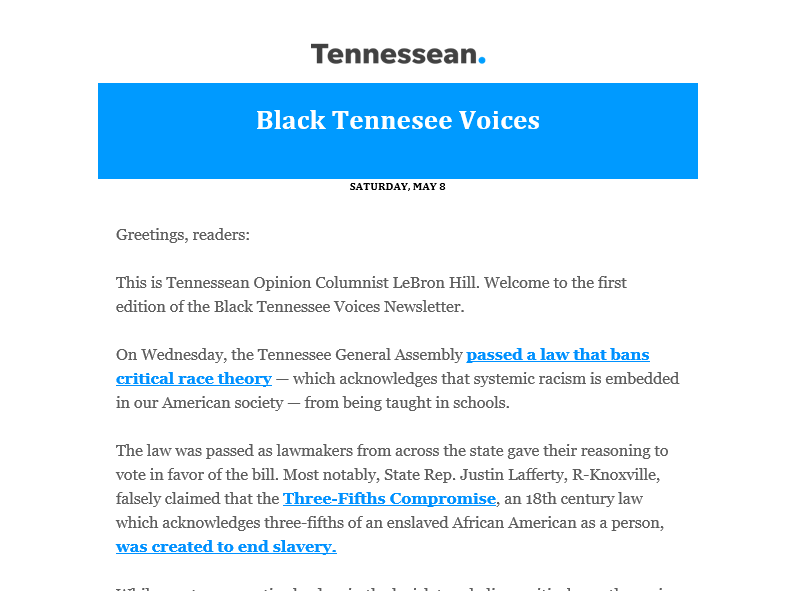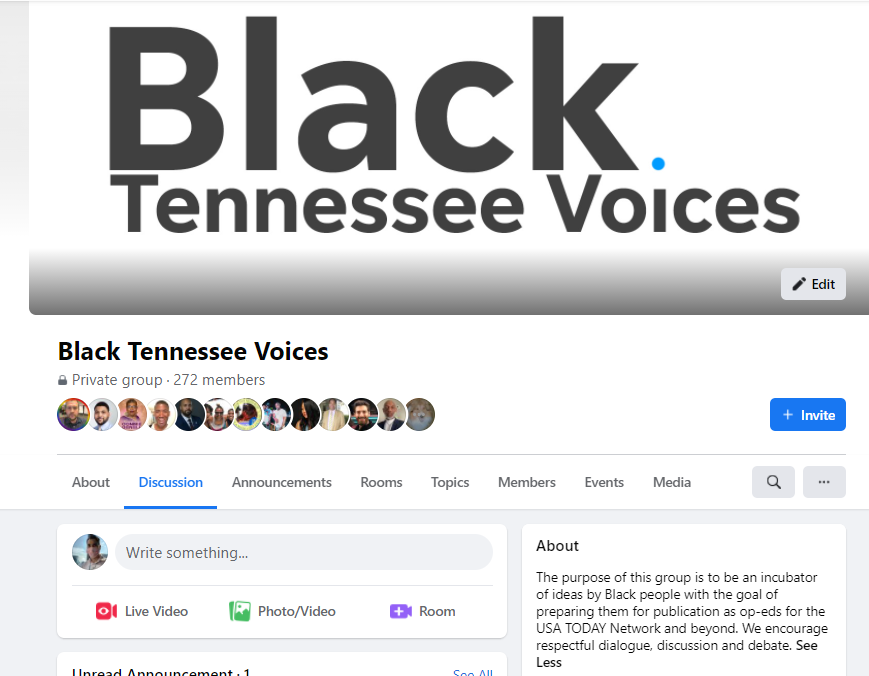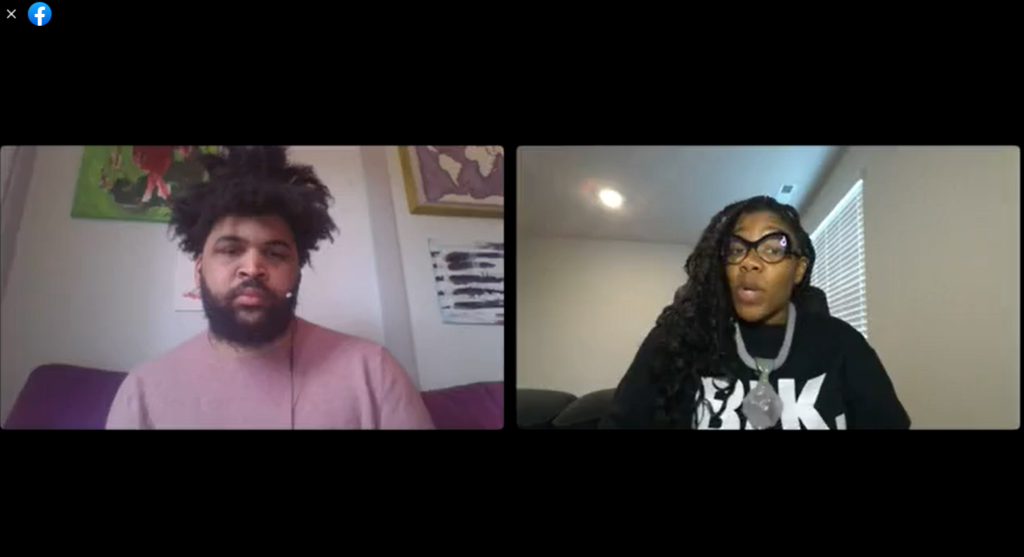How The Tennessean tells stories for and with Black residents
LeBron Hill, Ayrika Whitney and David Plazas, The Tennessean,This is a series on Better News to a) showcase innovative/experimental ideas that emerge from the Knight-Lenfest Newsroom Initiative and b) share replicable tactics that benefit the news industry as a whole. This “win” comes from LeBron Hill, opinion and engagement reporter at The Tennessean; Ayrika Whitney, manager, South Region Digital Optimization Team; and David Plazas, director of opinion and engagement for the USA TODAY Network Tennessee. The Tennessean participated in the Major Market Table Stakes program in 2020-21.
Learn more about Black Tennessee Voices on the “It’s All Journalism” podcast.
Question: What communities do you serve and what can you tell us about the history of your organization?
Answer: The Tennessean is the major daily newspaper in Nashville, Tenn., and the flagship of the USA TODAY Network South. The publication was founded in 1907 by avowed segregationists and prohibitionists. After the newspaper changed ownership in the 1960s, the new editor, the legendary John Seigenthaler, took The Tennessean on a pro-civil rights path. That commitment increased when Gannett bought the newspaper in the late 1970s.
Even so, the publication, like so many mainstream newspapers, primarily served a white audience in a city whose population today is 24% Black and that is home to four of Tennessee’s six historically Black colleges and universities.
The remnants of legal segregation are visible. Today, areas that were historically Black and in the urban core are being gentrified, and Black residents are being displaced at a higher rate than their white peers.
In 2016, The Tennessean formed a Diversity & Inclusion Task Force, inspired by a summit on serving diverse audiences cohosted by the American Press Institute and Temple University that year. That laid the groundwork for our Table Stakes engagement challenge. (In addition to overseeing Better News, API also manages the Major Market Table Stakes program the Tennessean participated in.)
Q: What problem were you trying to solve, and why was solving the problem strategically important for your organization?
A: We sought to go from being a publication that covers the African American community to transforming our newsroom into one that tells stories for and with Black residents. Our goal was to grow relationships and trust, increase the number of African American voices on our platforms and continuously work to reflect the community demographics in our newsroom.
Q: How is this approach related to Table Stakes (e.g. one of the 7 Table Stakes and/or an outgrowth of the Knight-Lenfest initiative, etc.)?
A: Our initiative was directly related to Table Stake No. 1 (“Serve targeted audiences with targeted content”).

This screenshot shows the first edition of the Black Tennessee Voices newsletter, launched in May 2021. The newsletter, curated by columnist LeBron Hill, has an average open rate of 40%.
Q: How did you go about solving the problem?
A: We were uncertain of the level of trust we had with Black residents. Most of our experience was anecdotal. But in assessing our publications, social media chatter and past metrics, we saw that the trust level was low, and we needed to work intentionally and deliberately to improve it.
We had a few tools that helped us experiment: an existing Tennessee Voices newsletter that featured compelling guest essays of the week and a Tennessee Voices video podcast that featured conversations with thinkers, leaders and innovators across the state. These were already designed with the idea to show diverse representation, but now we had a reason to accelerate and ramp up that focus on working with and for the Black community.
We found that the video podcast episodes featuring Black guests overperformed in views and engagement time compared with others. Our audience analyst presented us with research showing the opportunity to reach Black audiences through non-traditional newspaper tools such as video. We sought to build on that by being intentional about inviting and featuring African American guests regularly. That proved to be successful.
Q: What worked?
A: We built on our personal relationships with members of the community to help grow the number of submitted guest essays for our opinion page from Black writers.
In response to the murder of George Floyd in 2020, we published pieces from people who were feeling pain and wanted to share their trauma of experiencing racism.
We dedicated an entire opinion presentation to the voices of Black leaders and our journalists, which we published first digitally and then in our Sunday opinion section in early June of 2020. That sent a strong message that we wanted to achieve our mission of amplifying underrepresented voices.
The digital presentation was called “Tennessee Black writers talk about racism, social unrest and next steps” and included the writings of 16 authors all in one presentation along with hyperlinks at the start to give readers easy access to all the essays.
That led us to double the number of guest essays we received from African American writers from 2020 to 2021. Among featured essayists were Terri Lee Freeman, former president of the National Civil Rights Museum; Martin Luther King III who wrote about Tennessee issues; and newsroom journalists Mealand Ragland-Hudgins, Drake Hills and LeBron Hill, about their experiences facing racism.
We followed up with a second special Black Tennessee Voices print section in December 2020. In June 2021, we expanded our Insight section from four to eight pages and dedicated one page each week to the Black Tennessee Voices brand.
Of note: Diverse views are represented throughout the section, but this initiative is an intentional step to show the public that we are committed to the work of amplifying the voices of African American residents. Other sections include a page dedicated to our Civility Tennessee campaign, voices from across the state of Tennessee, a regular point-counterpoint and extensive letters to the editor. The anecdotal feedback has been very positive as readers have enjoyed seeing the newspaper grow after so many years of reductions.
Tennessee Voices video podcast
Our video podcast series Tennessee Voices, hosted by David and set up by Ayrika, strategically features diverse guests. The episodes featuring Black guests have performed the best, which validated metrics data we received from our audience analyst that African Americans disproportionately consumed more video news than other demographic groups. David invites guests, most of whom have written a guest essay for the USA TODAY Network Tennessee.
These are a few featured and successful videos from that series featuring Black guests:
- Jacky Ackbari, founder of the National Organization for Workforce Diversity, who questioned whether corporate “Black Out” campaigns would be sustained and not just performative
- Marquita Bradshaw of Memphis, the first Black woman to be nominated by a major party to run for U.S. Senate in Tennessee
- Judge Sheila Calloway of Nashville, who is taking innovative steps to help minors avoid entering the juvenile justice system by offering student-led restorative justice courts at their schools
- Dwayne Logan, the award-winning filmmaker of “Black Thoughts”
- Erik Moses, the new president of the Nashville Superspeedway and advocate for racing, which has typically focused on a white audience
The podcast’s conversational format invites the guests to talk openly about their passions and explore with the host challenging topics, including achieving equity and battling racism. They also shared their “guilty pleasures,” such as books, streaming lists and hobbies that helped them get through the pandemic.
Black Tennessee Voices newsletter
In October 2020, we used our existing Tennessee Voices newsletter and once a month dedicated it to Black voices, curated by LeBron.
Initially, the open rate was lower than the average. We originally experimented by telling readers this feature was a pop-up or takeover newsletter. But we realized the audience may not have been as keen because it was new. So by changing the types of headlines we used and focusing on strong issues of the day, such as “defund the police” and Confederate monuments, the newsletter started to outperform the average. Thus, the newsletter remained as a strong platform for diverse ideas, but the authors all happened to be Black.
That success led to the launch of the standalone Black Tennessee Voices newsletter in May, which has an average open rate of 40%. (The baseline for what is considered a successful newsletter by Gannett is 25%.) The newsletter offers a brief introduction by LeBron, who chooses five compelling reads of the week by Black authors or featuring Black guests of a podcast, for example. Most are in Tennessee. Sometimes, he will share a thought piece by someone from the USA TODAY Network on a topic like reparations.

The Black Tennessee Voices Facebook group was launched in November 2020. It’s a private group, which means people must request to join. This fosters a safe space free of racist and misogynistic trolling for meaningful conversations.
Facebook group
In November 2020, we also started a closed Facebook group called Black Tennessee Voices to foster meaningful conversations in a safe space free of racist and misogynistic trolling. LeBron also curates this page and has offered a mix of hard news, features and questions that keep the influencers in the group engaged.
We have also developed several ambassadors who share meaningful posts and spark excellent conversations. As of Sept. 1, the group has 274 members. Facebook analytics shows 228 members are active, by either sharing posts or raising discussions about topics happening locally and nationally.
Earlier in 2021, LeBron launched his own video series via the Facebook group, Black Tennessee Voices Conversations, a one-on-one show with influencers. These hour-long shows have an engagement time of 30 minutes on average. They stream live on the Facebook group and are posted to The Tennessean website a few days later and perform very well in viewership. Here are a few examples:
- Ashford Hughes, head of DEI for the Nashville public schools
- Kia Jarmon, an entrepreneur and local influencer in city affordable housing policy

Columnist LeBron Hill talks with Kia Jarmon during an episode of Black Tennessee Voices Conversations, a one-on-one show streamed live in the Facebook group. Jarmon is an entrepreneur and local influencer in city affordable housing policy.
D&I Task Force and staffing
The D&I Task Force is co-led by David, Ayrika and LeBron, and all staff are welcome to join monthly meetings where we bring in special guests, offer training on language and demographics, keep our journalists informed about our initiatives, and discuss topics of style, coverage decisions and standards.
On the staffing level, we grew even more adamant about recruiting and retaining journalists of color. That is reflected in our recent hires and interns. The newest member of the engagement team is a recent HBCU graduate, Kyra Watts, who started her job in early August.
Q: What didn’t work?
A: A big disappointment is that we were not able to develop the community partnerships we had envisioned when we first set up our challenge.
The COVID-19 pandemic restricted our ability to gather. Virtual organizing was not optimal for the work we wanted to do, especially since so much was already going on in the space of racial reckoning and community organizing. At the same time, using our platform to amplify the voices of people in these conversations provided wins and helped us gain trust with people around the community.
Q: What happened that you didn’t expect?
A: We had a slow start in the spring of 2020, and we were still finding our footing for several months. Part of the problem was trying to make the case, even in our own Table Stakes cohort, that we were not going to view Black citizens as a monolith.
However, we were able to eventually – and successfully – show that what members wanted to create was a space for people with a common experience to share their authentic selves and ideas.
LeBron masterfully guided and grew the Facebook group, and his conversations yielded new relationships and context that helped us do our jobs better. We were not sure it would work, given how social media communities can sometimes implode. We had vigorous conversations about whether to make the group public but decided to keep it closed because the members enjoyed the safe space.
Q: What would you do differently now? What did you learn?
A: We are applying the lessons of Black Tennessee Voices to an upcoming initiative called Latino Tennessee Voices. Our vision is clearer this time, because of the struggles we faced with BTV in trying to find our purpose and place.
The recently released 2020 Census numbers show Latinos are growing faster than the general population. In Tennessee, the population grew from 5% to 7% of the total population in 10 years, while it grew from 10% to 14% during that same time in Nashville. In all but one of Tennessee’s 95 counties, the Latino community grew.
This time, we are engaging Latinx influencers and leaders in our community before launch and inviting them to be a part of the conversation and asking them to help us mold the content. We are building on existing relationships and broadening them. With BTV, we initially felt reactive. Here, we will be proactive. Also, we have taken the time to study the media market carefully. Tennessee already has several Spanish-language offerings for the Latino community. For that reason, Latino Tennessee Voices will be primarily an English-language play. Studies from centers like Pew and stories from news organizations including USA Today show that the vast majority of Latinos and Latinas are bilingual and U.S.-born Latinx tend to be English-dominant by the third generation. There is an opportunity to serve a market that is presently not being served.
We are launching on Sept. 15. Our initial focus will be a community partnership and a newsletter. We have new allies and advocates in the company because of the success of BTV, which allowed us to get resources we needed for LTV right away.
Q: What advice would you give to others who try to do this?
A: An engagement challenge focused on building trust with a certain demographic of the community requires representation within the newsroom and support for that representation.
We have seen other newsrooms struggle because they may have no African American journalists on staff or their Black journalists may have duties that don’t allow them to focus on a challenge like this one.
That is important. David and Ayrika helped build the Black Tennessee Voices effort, and we were supported by our managers, but LeBron, who willingly took on this assignment and grew in his role, is pivotal to its success. Representation matters.